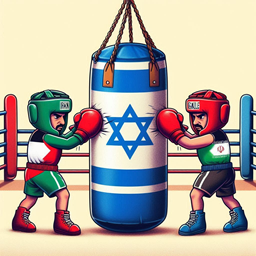By Ron Raskin

Since October 7th, tensions have surfaced between the Israeli government and its allies, particularly with the Biden administration. Calls to end the war in Gaza have intensified, often framed around the need for a hostage deal but extending beyond that. The underlying rationale seems to align with what I refer to as the “Punching Bag” policy.
The essence of this policy is that Israel (and other Western nations) should show restraint in their retaliatory actions. There’s a certain logic to this approach. Consider Newton’s third law: “For every action, there is an equal and opposite reaction.” According to this view, the way to reduce global tension and hostility is by taking minimal defensive actions without aggressive retaliation. The hope is that over time, the opposing side will also de-escalate and eventually turn toward peace.
As with many theories, sometimes they work, and sometimes they don’t. In the 1990s and early 2000s, this “Punching Bag” approach seemed reasonable. Imagine a young man walking down the street when a child runs up and punches him—whatever the reason, no one would expect him to retaliate against a small child! Back then, Israel was overwhelmingly stronger than its enemies, and the U.S. was the world’s undisputed superpower. Israel initiated the Oslo Accords, withdrew from Lebanon, and carried out the disengagement from Gaza. But those days are over.
Now, imagine that same young man walking down the street at night with his girlfriend, only this time three drunk criminals confront them. If he believes they pose a real threat to him and his girlfriend, the best course of action might be to strike first and ensure they’re incapacitated. That’s where Israel finds itself today—and not just Israel, but the entire Western world. A new reality requires a new policy and a fresh approach.
Unfortunately, such change takes time and demands difficult decisions on various aspects, particularly regarding demographic shifts between the West and other rising players in this game of the century. The winds of change are already blowing, evident in the rise of the right wing in Europe and the U.S., but unfortunately, this shift is marked by escalating internal conflict rather than constructive dialogue.
In the meantime, the old policies still dominate the discourse, as seen in a recent article by Dennis Ross. While his grasp of Iran’s strategy is unquestionable, the solution to the ring of fire around Israel remains debatable. Is the best course of action to disengage, cut losses, and end the conflict? Or should Israel strike back, hoping (without guarantees) that its adversaries won’t recover anytime soon?
The truth is, no one knows the definitive answer. On one hand, time might not be in Israel’s favor. While a U.S.-Israeli defense treaty is a step in the right direction, will the U.S. still be strong enough in five years to defend Israel against a new axis of evil? Will it even want to? Does it matter whether the treaty is just on paper or deeply rooted in shared interests and values as it has been for decades? The same questions apply to Saudi Arabia. Moreover, while “balance of power” policies can be effective in some contexts, they seem irrelevant in the Middle East. Did Hamas truly believe it could defeat Israel with its October 7th attack? Does it even care that it lost the majority of its forces and inflicted immense suffering on its own people? But on the other hand, Iran and its proxies have been ready for a retaliatory strike and might even leverage it to their benefit by inciting hatred among the local population.
Israelis have lived under constant threat for decades and won’t easily bend, even if conditions worsen, as long as they see hope on the horizon. The real worry is the ever-growing looming threat. Even if things appear stable today, most Israelis understand that it’s only a matter of time before a potential threat becomes immediate. It’s like taking out a high-interest loan—will it pay off, or will the growing debt eventually crush you? Given the situation and current trends, hitting back at both Hezbollah and Iran might actually be the better option.
If the U.S. and the West value their own future, they should also rethink their policies sooner rather than later.


The article does not predict any mode of response, neither Western world, no Israel as separate force, to the pressure of Islamic structures and forces. According to theory of Economical/Political cycles, the power of western civilisation and USA as it’s head will weaken, the ability of pro-Israel military force strikes effectiveness will diminish as well.
So, despite of drift towards right wing in internal policy in countries of “still white race”, this part of world loses an ability to retaliate strongly, while islamic population accumulate forces in their own countries and inside western countries as well.